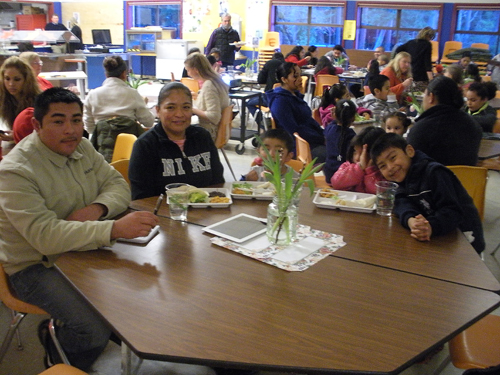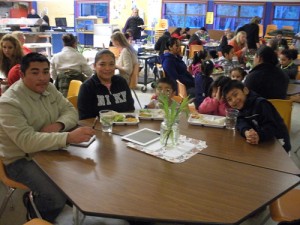— by Cara Russell —
Currently the Orcas Island Public school has 27 English Language Learner Students (ELL). “There are more and more ELL kids coming up into our schools, so we want to build a better program for them,” said ELL teacher Catherine Laflin at the February 13 ELL dinner, held in the Orcas School cafeteria.
Parents and students gathered together for the family dinner, with the purpose of the event being to help the parents of ELL students better understand what is going on in the classroom. The event was funded by a grant from an anonymous donor. This grant also includes publicity about the elements that the grant funds.
Families enjoyed a dinner of turkey soup, chicken or bean tacos, Spanish rice, and a salad bar. Teachers of the ELL students were invited to attend and along with them was ELL teacher Laflin, and Susan Stolmeier. Also attending the event was elementary Principal Kathy Page, middle-high school Principal Kyle Freeman, other school faculty, and interpreters Heidi Bruce and Faith Heath who helped facilitate communication between the Orcas Public School staff and the parents of the ELL Students.
After the dinner, Freeman, Page, as well as Laflin and Robin Freeman, spoke to the families about issues ahead of them, and they used the event to gather feedback from the families. Freeman talked about graduation requirements and the state tests the students need to pass in order to graduate, as well as the End of Course tests that they need to pass. Page spoke about the DIBELS (a reading abilities test) testing that is being done for every student K-6, and handed each parent their student’s results along with what the test means. “Since reading is the gateway into all subjects, the elementary school is really trying to examine how effective their reading practices are and support students in their continued progress,” said Laflin.
Tables were set up in the Middle School commons area where K-6 grade students were ready to teach the same language learning games to their parents that they have been playing at school. There were math games as well as some early literacy games, and families could take the games home with them to continue practicing basic skills. “We tried to pick games that didn’t rely heavily on language to make them accessible to all families,” said Laflin.
For families of 7-12 grade students, there was a demonstration of how to access some of the websites that have information about a student’s grades, classes, and more. Natasha Meskew showed them how to access Skyward—the school data base for grades, attendance, tardies, and basically all student information, from how much money they have left on their lunch account, what classes they have, what assignments are missing, who their teachers are, and how to contact them.
“We hope to have one more of these nights towards the end of the school year to review the year where parents feel the [ELL] program is succeeding and where there are challenges, as well as provide games and ideas of activities to do at home to help support their students, especially during the summer time to maintain the gains they’ve worked so hard all year long to make,” said Laflin.
**If you are reading theOrcasonian for free, thank your fellow islanders. If you would like to support theOrcasonian CLICK HERE to set your modestly-priced, voluntary subscription. Otherwise, no worries; we’re happy to share with you.**










At the same time ELL student and family inclusion in the school system is addressed, can we also consider maintaining and improving ELL students’ native language arts? It should not be that a child’s education virtually stunts the continuing learning of his or her mother language. Would an English-speaking parent want her 5-year-old never to have English spelling lessons or American literature?
Can we also consider foreign-language immersion for English speakers? As the number of matriculating Spanish-speaking students increases, a Spanish immersion classroom becomes possible (even though I don’t know the age distribution of the students). If you’re familiar with language acquisition, you can see how early-acquisition models would soon lead to further instruction of Spanish language arts, in Spanish!
I know. Funding. First, comes the recognition of a valuable goal. Then we get to work. What do you think?